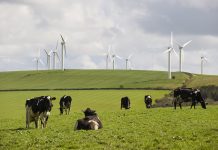Morrisons has pledged to be the first supermarket to be completely supplied by ‘net zero’ carbon British farms by 2030, five years ahead of the market.
Over the next nine years, Morrisons will work with its 3,000 farmers and growers to produce affordable net zero carbon meat, poultry, fruit and vegetables.
Morrisons expects that the first products to reach net zero carbon status will be eggs as early as 2022, followed by lamb, fruit, vegetables, pork and beef in the years to follow.
UK agriculture currently accounts for 10% of all UK greenhouse gas emissions, with new research revealing that two thirds of people consider the environmental impact of the food they eat. The National Farmers Union has asked farmers to work towards a 2040 net zero goal, and other supermarkets are working towards 2035.
Morrisons is British farming’s biggest supermarket customer, has its own expert Livestock and Produce Teams, works directly with farmers, and takes meat, fruit and vegetables direct from farms to its 20 fruit, vegetable and meat preparation sites.
This month, Morrisons will start working with a selection of meat and produce farmers – to create net zero carbon farm ‘models’. Together with the farmers they will look at the emissions picture through the whole lifecycle of farm produce – from germination to leaving the farmgate for a Morrisons store. Once a workable blueprint has been established, the models will then be shared with all Morrisons farmers, so that all food can be produced in this net zero carbon way.
The farm models will look at reducing carbon via: rearing different animal breeds; using low food-mile feedstuffs; using renewable energy and low emission housing; and, cutting down fuel and fertiliser use. They will also look to offset carbon emissions via: planting grassland and clover; restoring peatland, improving soil health; planting trees; and, seeding hedgerows.
Within agriculture, beef farming is the most carbon intensive – generating 45% of carbon emissions for only five per cent of products sold. Nearly half of this is down to methane produced by cattle. So in addition, Morrisons will work with its beef farms to use smaller cattle breeds, pick low methane feeds, and look at methane reducing supplements (e.g. seaweed).
Environment Secretary, George Eustice MP, said, “The UK is the first major economy to legislate for net zero emissions by 2050. Our farmers will play a key role in achieving this. It is encouraging to see Morrisons commit to being supplied by net zero carbon British farms on such an ambitious timescale, helping to protect the environment for future generations.”



